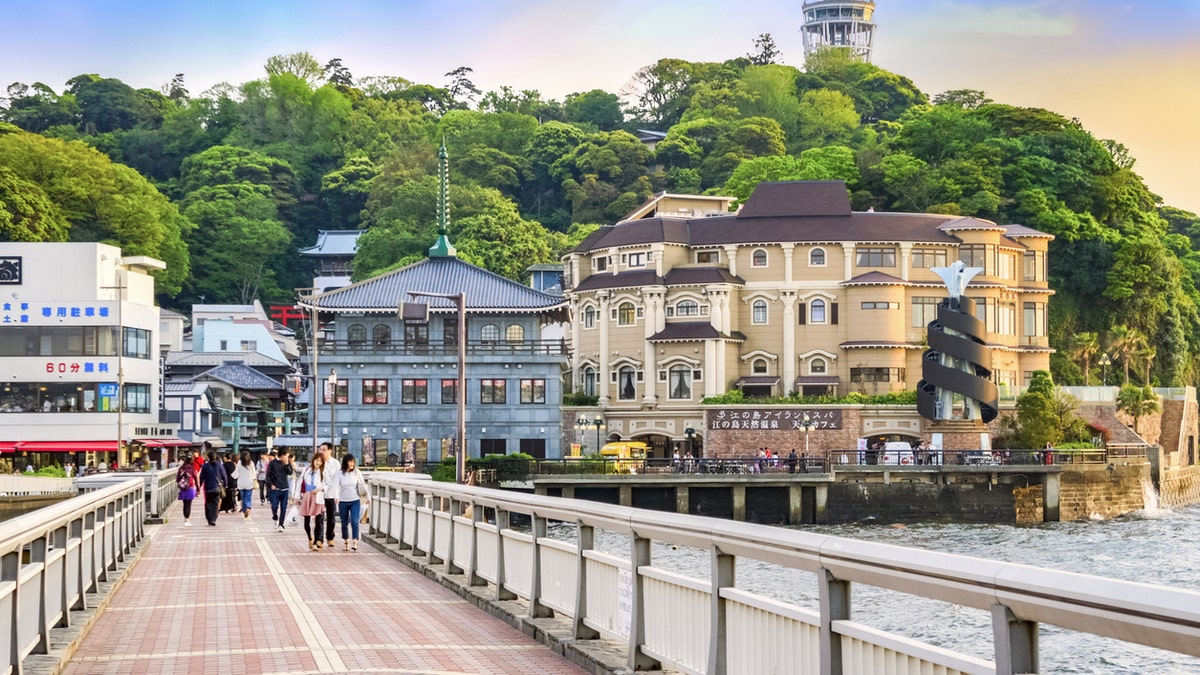
Kamakura, Japan, a seaside city in Kanagawa Prefecture known for surfing, Shinto shrines, Buddhist temples, and the Great Buddha of Kamakura is now requesting tourists and residents to refrain from eating while walking around the city. (iStock)
Go to a street market in any major city and you’ll be met by the sight of people hopping from food truck to food stall, gathering a variety of savory dishes and sweet treats to take to the nearby waterfront or park to share with their friends and family. You might even see someone else’s plate and think, “That looks amazing, I have to find out where they bought it.”
But you won’t see this in Kamakura, Japan, a seaside city in Kanagawa Prefecture known for surfing, Shinto shrines, Buddhist temples, and the Great Buddha of Kamakura.
It all comes down to a new, official policy that asks tourists and residents to refrain from eating while walking around the city, in effect since April 1.
However, tourists who break the new ordinance will not be issued fines or citations, CNN reported. The policy, posted on signs around the city, is not a warning, but a way to encourage good manners.
More From Travel + Leisure
- The TSA Is Predicting a Record Number of Travelers for Spring Break
- This Is How to Find the Best Airfare Every Time, According to a Flight Deal Expert (Video)
- Google Flights Wants to Help You Stick to Your Budget When Booking Flights
- Plane Drops 13,000 Feet Mid-Flight Because of Double-Engine Power Loss
Although litter is cited as one reason why the new ordinance has gone into effect, the Japan Times says that it’s also because food spillage has become a “public nuisance” since it gets on people’s clothes and stains them. This is especially the case on Komachi-dori, a 1,200 foot-long street that sees up to 60,000 visitors a day.
CNN adds that the problem goes beyond making a mess. In Japan, food is meant to be fully enjoyed and appreciated, something that many believe is impossible to do while they are on the move.
Norikazu Takahashi, president of the Komachi store association, disagrees, reaffirming that it is a merely a polite suggestion that visitors follow. “We can’t ban the act of eating while walking, as this is one of the ways to enjoy sightseeing,” he told the Japan Times. “We want to make the street a place where both travelers and residents can feel good.”
Kamakura is not the only city in Japan requesting people to eat their food where they bought it. For Kyoto’s Nishiki Market, litter is an all-too-common problem as many of its 120 shops offer street food style options, like shichimi ice cream, senbei, and fried fish on sticks. The latter in particular has become an issue due to worry that market-goers welding food sticks could injure others in the crowded space.
In October, the market put up signs telling people “no eating while walking” to combat these concerns. Like Kamakura, the policy is a request and not a rule.
Florence, Italy, on the other hand, has been banning eating on streets near the Uffizi Galleries and the Palazzo Vecchio since September. Anyone who breaks the rule could face fines between €150 to €500 (approximately $174 to $580). The ordinance was intended to cut down on the amount of trash and make the narrow streets easier to navigate.








































